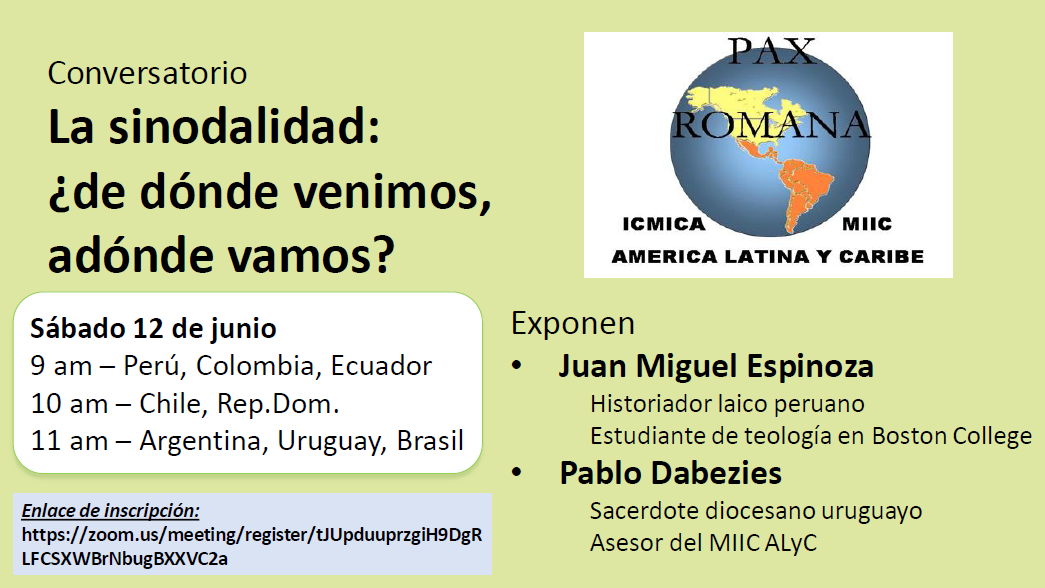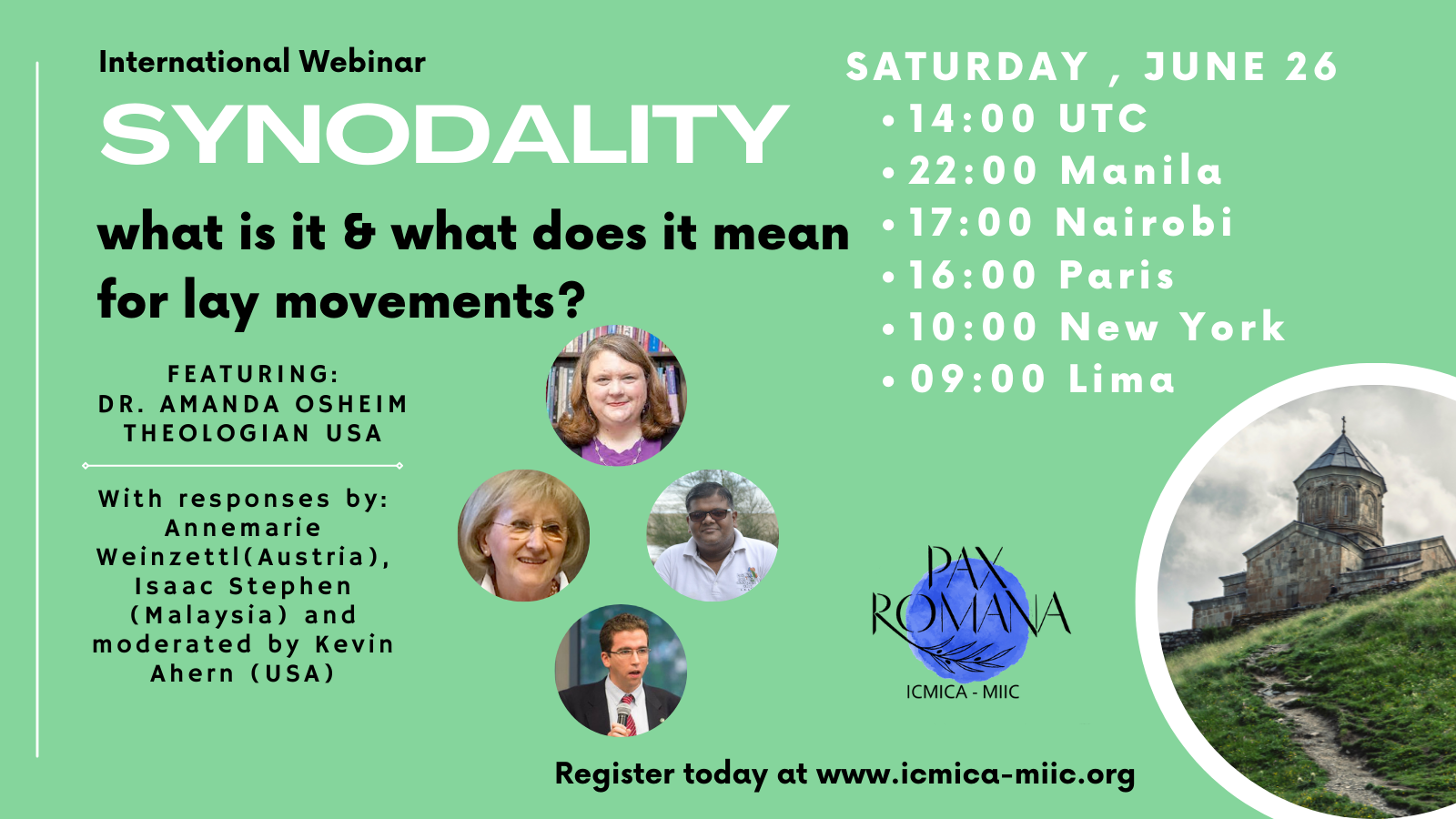What is my proposal? The announcement of the Gospel is provocative when it comes from a community that lives the Gospel … What Pope Francis says: Christians have the duty to announce the Gospel without excluding anyone, not to impose a new obligation, but as he who shares a jewel, indicates a beautiful horizon, offers a desirable banquet. The Church does not grow by proselytizing, but by attraction.
The community becomes a great challenge for evangelization.
– We come from a pastoral moment where the accent was placed in the cleric, the bishop, the priest, or the religion … Now the accent must be secular.
– Pastoral reality used to demand a big organization, a big structure to coordinate all activities and parochial groups. Now we are in another time.
– I propose to emphasize the community, where different charisms are integrated (as gift of the Lord).
What is this community? Which community are we talking about? the parish, the school, the movement, the family?…
We locate the community within the Evangelization process that describes the Vatican II document, Ad gentes (11-15). According to this document, which deals with the missionary activity of the Church, the process of evangelization presents the following dimensions: the testimony and the charity; the explicit announcement of the Gospel with the desire to awaken the initial conversion, the desire of God; the catechumenate and the Christian initiation, and the reception of the sacraments of initiation; and entry into the community.
However, the community must not only be understood with the word of evangelization, but also the subject, scope and destiny in which the Christian faith lives as a project of personal and community life; and from the community, faith is proposed as a new experience of fraternity to be lived. In this sense, without a Christian community, there is no possibility of a process of evangelization, since it is the area where the Gospel is lived and at the same time a platform from which it is announced.
But these Christian communities at the service of evangelization in an outgoing Church must be vital contexts in which people share this new form of life impregnated by the Christian spirit, albeit in a deficient and imperfect way. This is how we can affirm that transmitting of faith demands the community, as touchstone of the Christian life, understood as a way of life.
On the other hand, let’s look at the fact that young people are asking us “more prophecy than doctrine, more celebration than rites, more options of new love than prohibitions, more participatory communities than churches of clientele”
We no longer live in Christianity in which religiosity was assumed by tradition or context or by both. Today, faith means, especially, a personal and group process of conversion of the person to the project of Jesus. And the community is the appropriate microclimate for this process, as it offers, as we indicated previously, a life experience, a testimony and a personal commitment of each member in a concrete way of life, embodied in a life project. So the community is not another form of ecclesial or school organization, but a fundamental experience of the lived, shared, celebrated and committed faith.
Thus, a Christian community that has evangelization as a cuddly life cannot be a closed group, self-contemplating, isolated from the world, of the other people. He must transparent the Gospel, be a place of experience of the Risen One, a lived gospel laboratory and, from this experience, transmit.
The community experience responds to a human need. The community is not just a necessary element for evangelization. In addition, it responds to an anthropological need. We rely on two premises:
– Looking for significant personal experiences is an important cultural key to understand the current time. What a young one doesn’t experience as meaningful for him, will hardly become something incorporated into his life.
– Throughout this experience, there is a very powerful dynamizing center in the world of relationships. The relational dimension has always been fundamental in the constitution and development of the person, and today we can say that the affective and relational dimension is of utmost importance. We could affirm that faith becomes significant in life insofar as the relational world in which faith is shared is intensely significant.
Let us look at how young people are related. Their relationships are very spontaneous and little organized, very unpredictable and little defined and structured paths. These are relationships experienced with freedom, relationships for which people gradually choose and feel involved in. Experiences such as the Camino de Santiago with a group of young people confirms the previous statement. The important thing is not the catechetical pastoral structure or itinerary you’ve prepared. The significance of experience, even of the message, is coupled with the fire of personal relationships between them, and if these are significant, they can create beginnings of community experience and processes of faith.
The communities that we all need in the 21st century must have another style, different from the former: with flexibility of belonging, more spontaneous and independent, more aesthetic, managed by themselves, more inclined to cultivate spirituality in the front of the compromise, less conditioned, seemingly weaker.
As a consequence, very marked and standardized processes or itineraries, which have always been tried, today remain very relatively. And this raises a question that we have to answer in our pastoral work: how much do we have to combine the spontaneity and the necessity of the process or the minimum structure? How to make our parishes, sometimes very organized structures, become a framework of community experiences? Perhaps the lack of community experience is a cause of the sterility of our parish communities?
Recreate Christian ecosystems
A community experience can be very significant for children, young people, families, educators, catechists, as it represents a microclimate where faith is experienced personally, visually shared, celebrated meaningfully and committed prophetically. This evokes the movie about the monks of Algeria, martyrs: “Gods and men”. The community experience that is expressed dramatically in the last dinner of the monks is the framework where that group of believers live in faith, listen to the Word and celebrate the Liturgy, and practice fraternal love and charity, because it is a Monastery opened through the thought and mediation of peace.
Many times we have offered very structured communities or initiation processes. What may now be asked for novice generations are simpler, less pretentious experiences, but that make it possible to be close to the coherent testimony of the believer, the young man, the adult, the educator, whose experience becomes meaningful and attractive.
As Danielle Hervieu-Léger affirms, before to join a philosophy, a religion or a moral principle, I want to meet people who live in it and recognize them as being interesting and accomplished. In this sense, Henri Derroitte speaks of “recreating Christian ecosystems”, precisely in a world where being a Christian risks being a heroic option, as long as the environment is not provided (indifference, hostility, marginalization … ). Derroitte proposes Christian ecosystems as an environment of fraternal relationships, a vital environment in which each one’s faith can nourish itself and grow with the mutual contribution of all. This is what the General Directory for catechesis (No. 220) says, in other words: “a context or community environment rich in relationships”, which is like humus for the plant. Faith is a life that needs to be taken care of, it needs a vital environment. The Christian ecosystems we have to offer are a set of interactions that do not undermine the lived faith, such as a biological system, a community environment
The method of the Christian ecosystem is the small story, as Alvaro Chordi says to refer to the small communities of reference. Today’s young one is not linked to great stories. In other times, what was working first, were the illusions of the great story, the Tradition of the Church, the great institution, the great youth or family movement …, and then the small story of the community of life, the small group, more concrete and close. Today the method is the opposite: the young person is not linked to anything if he does not find the small story that is next to him, such as affective heat, with interpersonal relationships, in everyday life. From here, he will have to discover the great story.
We have gone one step further in our reflection. In our previous contribution we tried to cover how the community responds to a demand, to a person’s need, to a desire for interpersonal relationship. Now we see that we must try to channel this demand with a simple structure, at the service of the person, as an ecosystem that makes possible the growth in faith through the approach of the small story. We will have to make new steps to further specify the profile of these ecosystems or small stories in communities.
Concretion in small ecclesial communities
Here are two very interesting contributions to concretize a little more what the former community experience means.
The small ecclesial communities, according to the Asociación Española de Catequetes, are close communities, who take care of the personal relationship; small community nuclei, living ecclesial cells, of human size, with Christian identity, in ecclesial communion (connected to other communities, articulated within the local or particular Church), and in solidarity, attitude of service and co-responsibility.
Saint Augustine describes a Christian community as such: A Christian group is a group of people who pray together, but also speak together; they laugh together and exchange favors: together they shout and together they are serious; sometimes they disagree, but without animosity, as we are sometimes with ourselves, and using this little usual disagreement to always reinforce the usual agreement. They learn something from one another or teach each other, forget the absent ones, welcome happily those who arrive. They make manifestations of one type or another, expressions of the hearts of those who love themselves, expressed in the face, in the language, in the eyes, in a thousand gestures of tenderness. And they cook together food from the home, where souls come together and where several, in the end, are just one. (Sant Agusti, I Con fessions, 4, 8, 13).
I would also like to propose the difference between a team and a community: A team is a group of people whose purpose is to perform a common action. The team is gathered to work together. The community, regardless of whether a common action is carried out or not, deals only with the people that form it. That is, it gives priority to “being” about “doing”. From here I turn to the question that is leading this writing: how to make our parochial communities become Christian ecosystems, to use the definition of Henri Derroitte. I dare to make three suggestions:
Parish: coordinator of groups – community. Sometimes it can happen that the parish is more a group coordinator, a cluster of groups, and especially groups-teams of work, than a community. Rather more doing things than being. Therefore, for the parish to become more community it is necessary to take care of the people who form it. This is to establish instruments to take care of ourselves as a person. It is not enough to do the initial programming of the activities and then the evaluation. This is the case of a team. We must include in our programs spaces to take care of our life, our faith, in order to make memory of why and for whom we do everything we do or we are in the parish. I think it’s worthwhile looking for moments and spaces to share life, what happens to us, what worries us or what excites us, moments of prayer or celebration together, and moments of cooking together and eating, to give some examples.
Parish Council: organizational-management-government-community. Sometimes I think that many of the parochial councils are genuine governing teams of the rector, teams of senior management. And in a way, this is the mission of the councils, but they should have another style. It is true that the council should favor the organization of the parish, and this is why there is an agenda and an act; But, can’t we give more of a tone of fraternity, a sense of apostolic community that stands by the evangelizing mission that has the parish? Therefore, it is not enough to make decisions or help to make decisions for the rector, or simply to be spaces for information or planning. The advice is eminently a space of discernment or help for discernment, and this is more of prayer than organizing. How to do it? I know that it is very subtle and not easy, it is a question of style that depends a lot on the concrete persons that are part of it.
Share the urgency of the announcement of faith. I think our communities are too depending of what should be done, and especially what has been done so far. What Pope Francis tells us that we should not repeat: “we have always done this”, it is very present in our parochial communities. Keeping in mind that we must go out to announce the Gospel to new people, give new dynamism to the parish, orient the view to another perspective, and help to become aware that what we need is not just organized equipment, but rather true fraternities of loved Christians. What makes Christian life attractive is not “doing work”. It is above all the love that is experienced among us. If we manage to integrate new people among us, they will also be heros to regenerate our community tissues and get out of our inerties.
I end up with a dialogue between Francis d’Assisi and his brother Tancred:
– But, wait, where to start? aked Tancred.
– The most urgent thing, Francis said,” is to ask to have the Spirit of the Lord. Only Him can make us good, deeply good, with the kindness that is identified with our closest being.
He paused for a moment, then he continued:
The Lord has sent us to evangelize men. But have you ever thought what it means to evangelize men? Look, evangelizing a man is to say: You are also loved by God in the Lord Jesus. And not just tell him, but really think about it. And not only to think about it, but to behave with him in such a way that he discovers and feels that there is something saved in him, something greater and more noble than he could imagine, and that arouses a new awareness of himself. That is to announce the good news: to offer your friendship. A real friendship, selfless, without condescension, made of trust and deep esteem.
We need to go towards men. The task is delicate. The world of men is an immense battlefield for wealth and power. Confrontations and atrocities in disgust hide the face of God. Especially, when going to them, we do not appear as a new kind of competitor. We must be in the midst of them, pacifist testimonies of the Allmighty, without coveting, nor contempt, able to make us our real friends. It is our friendship they expect: a friendship that makes them feel loved by God and saved by Jesus Christ.
Translated from Catalan





Leave A Comment
You must be logged in to post a comment.